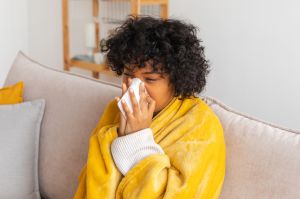
Source: Iuliia Zavalishina / Getty
Being prepared for virus peak season is more critical than ever. Whether it’s the annual flu season or the resurgence of novel viruses, taking proactive measures to safeguard your health and well-being is essential.
1. Stay Informed
Knowledge is your first line of defense. Stay informed about the viruses that tend to peak during specific seasons in your region.
2. Get Vaccinated
Vaccination remains one of the most effective ways to protect yourself and your community from preventable diseases. Consult your healthcare provider to ensure you’re up to date on all recommended vaccines, including flu shots and any other relevant vaccines for your age and health condition.
3. Maintain Good Hygiene
Practicing good hygiene habits can significantly reduce your risk of infection. Wash your hands frequently with soap and water for at least 20 seconds, especially after being in public places or touching surfaces. Use hand sanitizer when soap and water are unavailable.
4. Boost Your Immune System
A strong immune system is your body’s natural defense against viruses. Maintain a balanced diet rich in fruits, vegetables, and whole grains. Get regular exercise, prioritize sleep, and manage stress to help keep your immune system in top shape.
5. Stock Up on Supplies
During virus peak season, it’s wise to have essential supplies on hand. Stock up on non-perishable foods, over-the-counter medications, and hygiene products.
6. Practice Social Distancing
When viruses are spreading rapidly, consider limiting close contact with others, especially in crowded spaces. Follow local health guidelines regarding gatherings and social distancing measures.

















